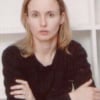Natalie Jeremijenko

Natalie Jeremijenko
Natalie Jeremijenkois an artist and engineer whose background includes studies in biochemistry, physics, neuroscience and precision engineering. She is an active member of the net.art movement, and her work primarily explores the interface between society, the environment and technology. She has alternatively described her work as "X Design"and herself as a "thingker". She is currently an Associate Professor at New York University in the Visual Art Department, and has affiliated faculty appointments in the school's Computer Science and Environmental Studies...
NationalityAustralian
ProfessionArtist
CountryAustralia
I watch children a great deal; their idea is that rules are always negotiable, whereas you absolutely cannot joke at the airport about your toothpaste, and you cannot rollerblade in Grand Central Station. I keep running up against these things.
A lot of my work concerns a crisis of agency - what can we do?
There's nothing wrong with being anthropomorphic. That's how we understand the world.
I am committed to the idea of information politics. That is how contemporary politics are played out.
I created a successful outdoor youth festival - the Liverd festival - against all good advice. It was a great way to explore and investigate social sculptures. Having that as my kind of studio, outside of a museum or precious white-cube gallery, that was a kind of education.
Formally, I did my studies in the sciences, but I was very conscious that I was being deprived of culture. While studying neuroscience, I was running a rock-music festival and was able to use that as a platform to explore what it takes to produce art for 20,000 inebriated 20-somethings.
Eating together is the most intimate form of kinship. By scripting a work where we share the same kind of food with fish, I'm scripting our interrelationship with them.
I used to have a lovely Chelsea loft - then I got divorced.
Are kids smarter than adults? All evidence points to that being true.
Experimenting with your own life is the most fundamental medium we have.
I believe in a tongue-first exploration of the world. Food is our most immediate daily relationship to our ecosystem, and there is something delectable and intriguing about it.
Juggling many projects and having all these accidental collisions that you can't predict enables a kind of comparative thinking. To focus on a single project from beginning to end is extremely difficult, not just for me, but for many people.
Information is not just something you download from the Web. The way trees grow and where birds choose to live are much better signs of water quality than all the data being collected by the EPA.
The art world is a very prissy little thing over in the corner, while the major cultural forces are being determined by techno science.